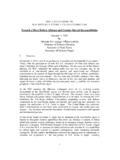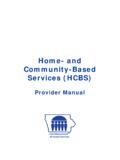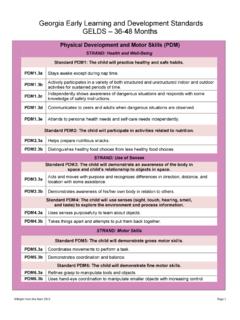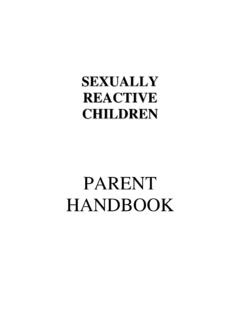Transcription of Innovations in College Counseling ACPA …
1 Innovations in College Counseling acpa Convention 2009. Information Sessions: A Ridiculously Easy Way to Screen for Group Diana E. Damer, University of Texas at Austin Counseling and Mental Health Center At the Counseling and Mental Health Center at the University of Texas in Austin, we use Pre-group information sessions rather than pre-group interviews to prepare and screen students for group. For the following reasons, we have found the pre- group information session to be invaluable: It is more efficient: it saves time and energy and allows co-leaders to have more time for planning. It gives students a taste of what group would feel and look like. It serves to screen out students who may not be ready for group and reduces drop out rates.
2 It allows co-leaders to systematically prepare students for group. It provides an efficient way to complete documentation of the pre-group interview process. Counseling AND MENTAL HEALTH CENTER. The University of Texas at Austin AGENDA FOR PRE-GROUP INFORMATION SESSION. Personal Exploration Groups (Process Groups). 1. Students are directed back to the group room to complete the top part of the Pre-group Information Session (PGI) Note. 2. Welcome, introductions, and explanation of the format of the information session. 3. Review day/dates/time of group. 4. Provide orientation to Personal Exploration Group. See Yalom (2005) Appendix Information and Guidelines for Participation in Group Therapy . a. Effectiveness of group therapy b.
3 Some goals of group therapy c. Confidentiality d. What do you do in group? How are you expected to behave? - no prescribed agenda, members talk about relevant personal/interpersonal issues - emphasis on the here and now, especially the relations between members - importance/pace of self-disclosure - type of feedback that is most helpful - what is less helpful ( , general discussions, direct advice giving). - discouragement of outside contact/groups as a social laboratory - role of the group leaders e. Initial commitment to attend certain # of sessions/predict doubts about group f. Attendance and group cohesion - regular attendance - inform leaders ahead a time re: lateness or absences - predict discomfort and reframe it as a positive thing - express positive feelings about opportunity to work with them 5.
4 Go over anything in group agreement that has not already been covered. 9. Potential group members complete second part of PGI note while group leaders meet individually (5-7 minutes) in a separate room with each person. If group is large, leaders can split up in two different rooms. In individual meetings: a. Review/clarify responses on form. Determine fit for group. b. Sign agreement c. Give business cards with start date. Counseling AND MENTAL HEALTH CENTER. The University of Texas at Austin PRE-GROUP INFORMATION SESSION NOTE. Personal Exploration Group Name: DOB: Date: 1. How did you learn about this group? 2. Please briefly describe your previous history of mental health treatment and current involvement with mental health services at CMHC or elsewhere.
5 Please complete the following questions after the group information has been presented: 3. If you could change anything about the way you relate to or interact with others, what would you change? 4. Are there any aspects of how you relate to others about which you might like to receive feedback? How might it be helpful for you to give and receive feedback? How might this be challenging for you? 5. What do you hope to gain by participating in this group? See the back of this form for examples of goals that participants may have for group therapy. 6. What concerns or questions do you have about being a member of this group? For group leader use: Provided information about group, including day/dates/time of group.
6 Disposition: __Student will join group __Leader or student decided that group is not a good fit Signature: _____ Date: _____. (See Other Side). Examples of goals that can be addressed in group therapy: I would like to: 1. be able to express preferences/opinions 2. be able to ask for what I need 3. be more comfortable sharing personal information 4. deepen my emotional connection with others 5. be less fearful of the judgment of others 6. be able to openly disagree with others 7. be able to open up to others 8. be less afraid of offending/upsetting others 9. be closer to others 11. be less self-critical 12. be less fearful others seeing and judging my real self . 13. be able to make a mistake and not feel ashamed 15.
7 Remain engaged rather than withdraw from others when I'm stressed out 16. be able to express certain emotions ( , sadness, anger) in constructive ways 17. be able to trust others 18. explore feedback I have received that I'm too sensitive (or too insert adjective here ). 19. feel more confident in my decisions 20. be less influenced by the opinions of others 21. take less responsibility for other people (less caretaking ). 22. be able to express positive feelings toward others 23. be able to set boundaries/limits with others 25. be less afraid of rejection 26. be able to tolerate conflict Counseling AND MENTAL HEALTH CENTER. The University of Texas at Austin AGENDA FOR PRE-GROUP INFORMATION SESSION. Build Your Social Confidence Group 1.
8 Students are directed back to the group room to complete the Pre-group Information Session Note. 2. Welcome, introductions, and explanation of the format of the information session. 3. Review day/dates/time of group. 4. Provide orientation to Build Your Social Confidence Group. 5. Group Size: approximately 6-10. 6. Group Focus: explain who is appropriate for group and explain group support component 7. Group Model: People with social anxiety tend to overestimate the danger of criticism, rejection, or embarrassment, involved in social situations and underestimate their ability to cope with rejection, criticism, or embarrassment. They also tend to be overly focused on what's happening in their bodies and how they are being perceived by others.
9 The group will help you to reassess social danger, increase your confidence in handling perceived dangers, and decrease your focus on self. We will do this via various exercises, including role plays of anxiety provoking situations. 8. Review Group Agreement 9. Potential group members complete additional rating forms while group leaders meet individually (5-7 minutes), in a separate room, with each person. If group is large, leaders can split up in two different rooms to interview simultaneously. In individual meetings: a. Review/clarify responses on form. Determine fit for group. b. Sign agreement c. Give business cards with start date. Counseling AND MENTAL HEALTH CENTER. The University of Texas at Austin PRE-GROUP INFORMATION SESSION NOTE.
10 BUILD YOUR SOCIAL CONFIDENCE. Name: DOB: Date: 1. How did you learn about this group? 2. How does social anxiety affect your life? 3. What do you hope to gain by participating in this group? 4. Please briefly describe your previous history of mental health treatment and current involvement with mental health services at CMHC or elsewhere. 5. The expectation is that group members will attend weekly, participate in group discussions, role-plays, and activities, and complete follow-up homework assignments. Do you believe that you can commit to this level of participation? 6. What concerns do you have about being a member of this group? Do you have any questions? For group leader use: Provided information about group, including day/dates/time of group.








